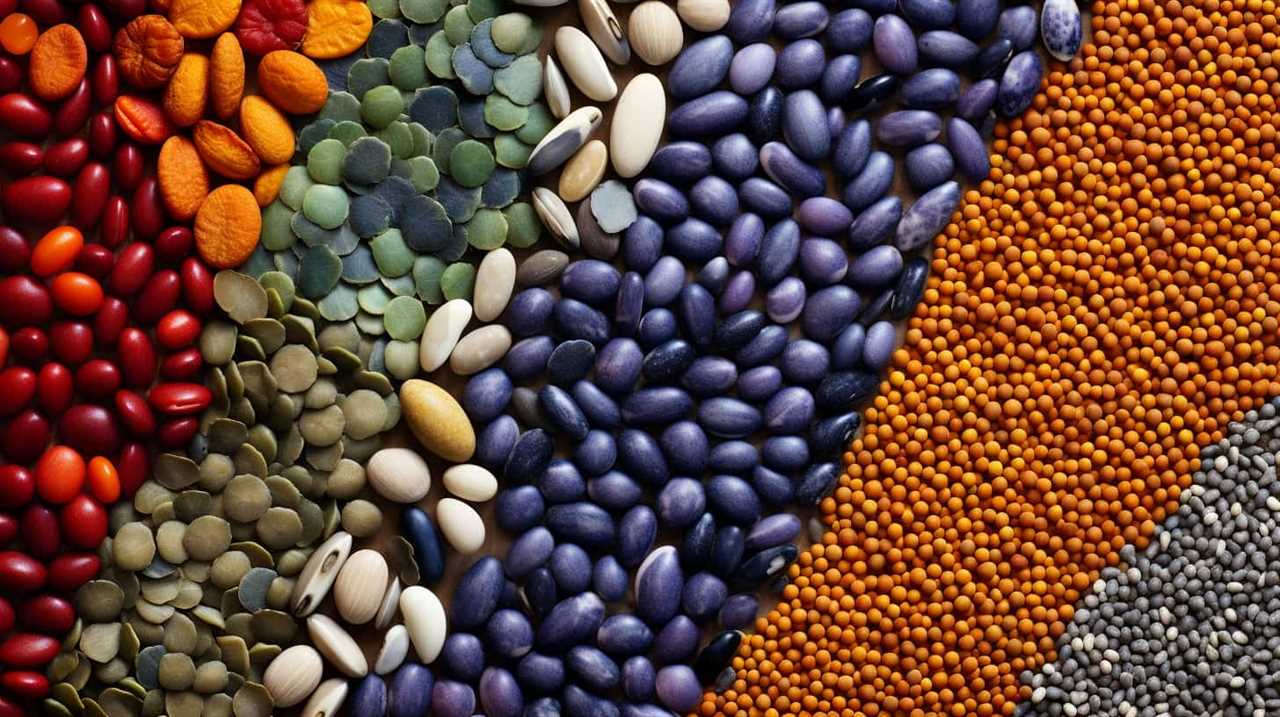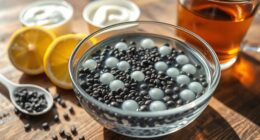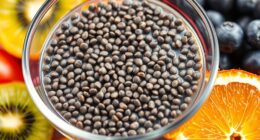
I have a small secret I want to share with you: transitioning to a vegan lifestyle doesn’t mean giving up protein-rich foods. In fact, there are 12 seed-based alternatives high in protein that are perfect for those following a plant-based diet.
Chia seeds, hemp seeds, flax seeds, and more offer a wealth of nutrients and can be easily incorporated into your meals. So, if you’re ready to break free from the misconception that vegans lack protein, join me on this journey of delicious and nutritious liberation.
Key Takeaways
- Chia seeds, hemp seeds, flax seeds, pumpkin seeds, sunflower seeds, sesame seeds, quinoa seeds, amaranth seeds, buckwheat seeds, pomegranate seeds, watermelon seeds, and poppy seeds are all high-protein seed alternatives that can be incorporated into a vegan diet.
- These seeds are nutrient-dense and packed with protein, fiber, and omega-3 fatty acids, making them excellent additions to meals.
- Including these seeds in your diet can promote satiety, aid digestion, support heart health, and provide essential nutrients like calcium, magnesium, and phosphorus.
- The versatility of these seeds allows them to be used in a variety of recipes, adding flavor, texture, and a nutritional boost to dishes.
Chia Seeds
I personally rely on chia seeds as a high-protein seed alternative in my vegan diet. Chia seeds are small, nutrient-dense seeds that offer numerous benefits. They’re packed with protein, fiber, omega-3 fatty acids, and antioxidants. These tiny seeds have a neutral taste and can be easily incorporated into a variety of dishes. Chia seed recipes are quite versatile, ranging from chia puddings and smoothies to energy bars and baked goods.
One of the main benefits of chia seeds is their ability to absorb liquid and form a gel-like consistency, which can help promote satiety and aid in digestion. Additionally, chia seeds are a great source of calcium, magnesium, and phosphorus, making them beneficial for bone health.

Now, let’s move on to the next high-protein seed alternative: hemp seeds.
Hemp Seeds
A versatile and nutrient-rich option, hemp seeds are an excellent high-protein seed alternative for my vegan diet.
Not only are hemp seeds a complete protein source, containing all nine essential amino acids, but they’re also packed with other essential nutrients.
These tiny seeds are rich in omega-3 and omega-6 fatty acids, which are beneficial for heart health and inflammation reduction.

Additionally, hemp seeds are a great source of fiber, aiding in digestion and promoting feelings of fullness.
Incorporating hemp seeds into my diet is easy and delicious. I can sprinkle them on salads, blend them into smoothies, or use them in baking.
There are also various hemp seed recipes available, such as hemp seed energy balls or hemp seed granola bars.
With their numerous benefits and versatility, hemp seeds are a valuable addition to any vegan diet.

Flax Seeds
Flax seeds are a nutritious addition to a vegan diet. Packed with essential nutrients like omega-3 fatty acids, fiber, and protein, flax seeds offer numerous health benefits.
They’ve been linked to improved heart health, reduced inflammation, and improved digestive function.
Flax Seeds Nutrition Facts
The nutritional value of flax seeds is significant, making them an excellent addition to a vegan diet. Flax seeds are packed with nutrients that support overall health and can aid in weight loss. These tiny seeds are a great source of plant-based protein, fiber, and omega-3 fatty acids. Incorporating flax seeds into smoothies is a convenient and delicious way to boost your intake of these beneficial nutrients.
Here is a breakdown of the nutritional composition of flax seeds:

| Nutrient | Amount per 100g |
|---|---|
| Protein | 18g |
| Fiber | 27g |
| Omega-3 fatty acids | 22.8g |
| Calories | 534 |
As you can see, flax seeds are not only rich in protein and fiber but also contain a substantial amount of omega-3 fatty acids. These essential fatty acids have been linked to numerous health benefits, including reducing inflammation and improving heart health. In the next section, we will explore the various health benefits of incorporating flax seeds into your diet.
Flax Seeds Health Benefits
Incorporating flax seeds into my diet has numerous health benefits. These tiny seeds pack a powerful punch when it comes to heart health and weight loss. Here are three key reasons why flax seeds are a valuable addition to any diet:
-
Heart Health: Flax seeds are rich in alpha-linolenic acid (ALA), a type of omega-3 fatty acid that has been shown to reduce the risk of heart disease. Consuming flax seeds regularly can help lower blood pressure, reduce inflammation, and improve overall heart health.
-
Weight Loss: Flax seeds are high in fiber, which helps promote feelings of fullness and aids in weight management. Additionally, the healthy fats and proteins in flax seeds can help boost metabolism and support a healthy weight loss journey.

-
Omega-3 Fatty Acids: Flax seeds are one of the best plant-based sources of omega-3 fatty acids. These essential fats play a crucial role in brain health, reducing inflammation, and supporting overall well-being.
In the next section, we’ll explore the health benefits of pumpkin seeds.
Pumpkin Seeds
I love incorporating pumpkin seeds into my vegan diet as a high-protein seed alternative. Pumpkin seeds not only add a delicious crunch to my meals, but they also provide numerous health benefits.
These tiny seeds are packed with essential nutrients, including protein, fiber, magnesium, zinc, and omega-3 fatty acids. Protein is crucial for building and repairing tissues, and pumpkin seeds are an excellent plant-based source. They can be used in various recipes, such as salads, granola bars, or even as a topping for soups and smoothies.

Additionally, pumpkin seeds are rich in antioxidants, which help protect against oxidative damage and reduce inflammation in the body. Incorporating pumpkin seeds into your vegan diet can be a simple and nutritious way to boost your protein intake and support overall health.
Sunflower Seeds
When incorporating sunflower seeds into my vegan diet as a high-protein seed alternative, I love their nutty flavor and the array of health benefits they offer. Here are three reasons why sunflower seeds are a great addition to your meals:
-
Nutritional Value: Sunflower seeds are packed with essential nutrients like vitamin E, magnesium, and selenium. These nutrients support heart health, boost immunity, and promote healthy skin.
-
Cooking Methods: Sunflower seeds can be enjoyed in various ways. You can sprinkle them over salads, blend them into smoothies, or roast them for a delicious snack. They also make a great addition to baked goods like bread and muffins.

-
Versatility: Sunflower seeds can be used in both savory and sweet dishes. They add a delightful crunch to salads, stir-fries, and grain bowls, while also enhancing the flavor and texture of granola bars and energy balls.
Transitioning to the next section, let’s now explore the wonders of sesame seeds.
Sesame Seeds
For a vegan diet, incorporating sesame seeds as a high-protein seed alternative has been a game-changer for me. Sesame seeds aren’t only packed with essential nutrients, but they also add a delicious nutty flavor to a variety of dishes.
When it comes to sesame seed recipes, the options are endless. One of my favorite ways to use sesame seeds is in baking. Adding them to breads, muffins, and cookies not only boosts their protein content but also gives them a delightful crunch.
You can also make homemade sesame seed bars or sprinkle them over salads and stir-fries for extra protein and texture.
Quinoa Seeds
Continuing the exploration of high-protein seed alternatives, incorporating quinoa seeds into my vegan diet has been a game-changer. Quinoa seeds aren’t only delicious, but they also offer a wide range of nutritional benefits.
Here are three reasons why I love incorporating quinoa seeds into my meals:
-
Quinoa seed recipes: Quinoa seeds can be used in various recipes, from salads and stir-fries to breakfast bowls and even desserts. Their versatility makes it easy to incorporate them into any meal and enjoy their nutty flavor.
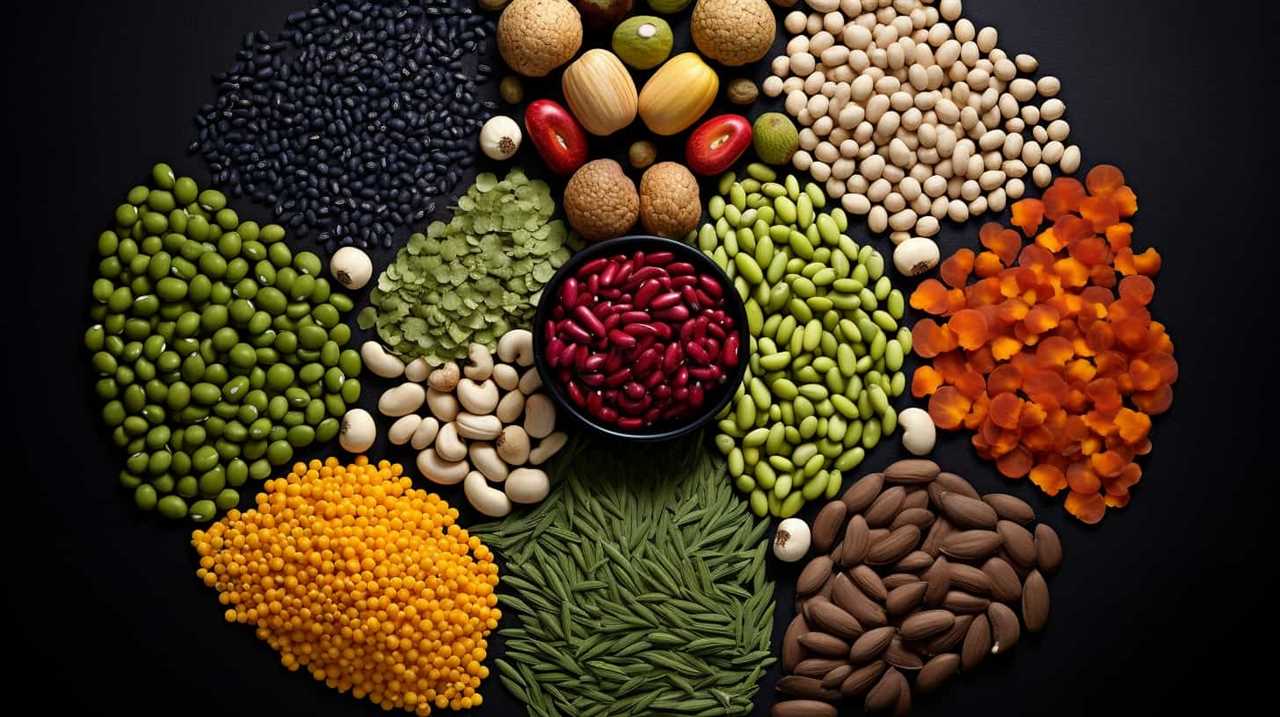
-
Quinoa seed nutritional value: Quinoa seeds are packed with protein, containing all nine essential amino acids. They’re also a great source of fiber, iron, magnesium, and folate. This nutrient-dense seed helps to support muscle growth and repair, boost energy levels, and promote overall well-being.
-
Transition to amaranth seeds: While quinoa seeds are a fantastic addition to a vegan diet, exploring other high-protein seed alternatives like amaranth seeds can offer even more variety and nutritional benefits.
Now, let’s dive into the next subtopic: amaranth seeds.
Amaranth Seeds
I love incorporating amaranth seeds into my vegan diet because of their high protein content and versatility in various recipes. Amaranth seeds are a great source of plant-based protein, containing all essential amino acids. They’re also packed with nutrients like iron, magnesium, and phosphorus.
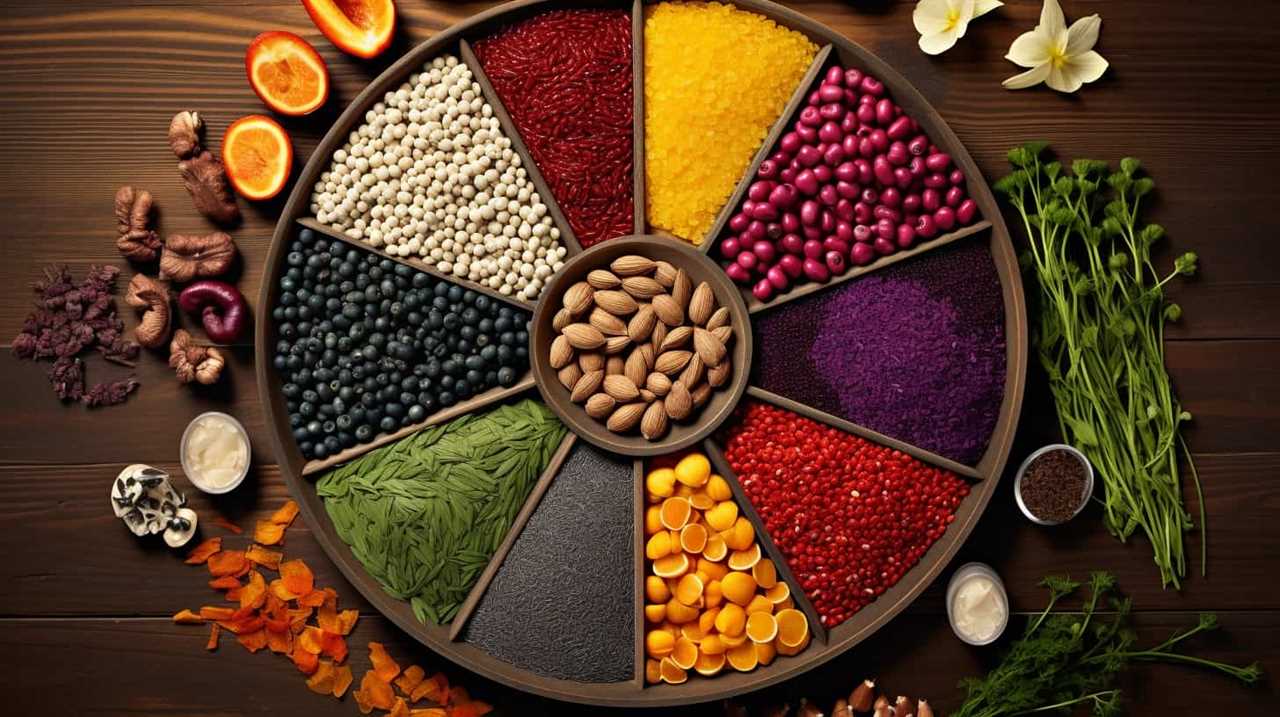
When it comes to cooking with amaranth seeds, they can be used in a variety of ways. They can be cooked and used as a nutritious side dish or added to salads for an extra protein boost. Amaranth seeds can also be ground into flour and used in baking, adding a nutty flavor and a nutritional punch to breads, muffins, and pancakes.
Buckwheat Seeds
I personally find buckwheat seeds to be a great addition to a vegan diet due to their numerous nutritional benefits. These seeds are rich in essential amino acids, fiber, and minerals like magnesium and manganese.
Additionally, buckwheat seeds are versatile and can be cooked in various ways, such as boiling, roasting, or grinding into flour.
Nutritional Benefits of Buckwheat
The nutritional benefits of buckwheat seeds include a high protein content and a wide range of essential nutrients. Here are three reasons why buckwheat seeds are a valuable addition to a vegan diet:

-
Protein Powerhouse: Buckwheat seeds are rich in protein, making them an excellent source of plant-based protein for vegans. Protein is essential for building and repairing tissues, and it also helps to keep you feeling full and satisfied.
-
Nutrient-Rich: Buckwheat seeds are packed with essential nutrients like magnesium, manganese, copper, and fiber. These nutrients support overall health and can help prevent chronic diseases like heart disease and diabetes.
-
Versatile in Cooking: Buckwheat seeds can be used in a variety of cooking techniques and recipes. They can be ground into flour for baking, cooked as a side dish, or added to soups and salads for extra texture and flavor.
With its nutritional benefits and versatility in the kitchen, buckwheat seeds are a great choice for vegans looking to boost their protein intake and enhance their meals.
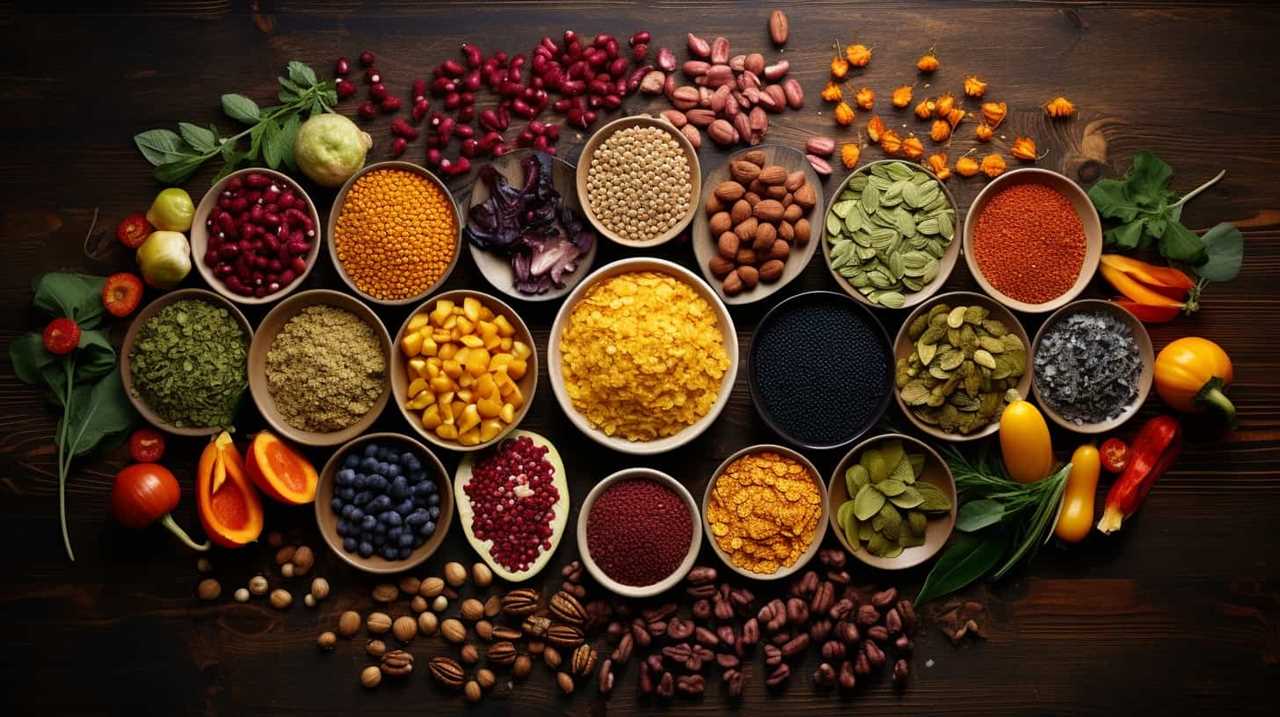
Now let’s explore some delicious cooking options with buckwheat seeds.
Cooking With Buckwheat Seeds
When cooking with buckwheat seeds, you can easily incorporate them into a variety of delicious and nutritious meals. Buckwheat seeds are versatile and can be used in both sweet and savory dishes. They have a nutty flavor and a slightly crunchy texture, making them a great addition to salads, soups, stir-fries, and baked goods. Here are some cooking techniques and recipe ideas to help you make the most of buckwheat seeds:
| Cooking Techniques | Recipe Ideas |
|---|---|
| Boiling | Buckwheat porridge |
| Roasting | Roasted buckwheat salad |
| Grinding | Buckwheat flour pancakes |
| Sprouting | Buckwheat sprout salad |
| Steaming | Steamed buckwheat dumplings |
These are just a few examples of how you can incorporate buckwheat seeds into your meals. Get creative and experiment with different flavors and ingredients to discover new and exciting ways to enjoy this nutritious seed. Happy cooking!
Pomegranate Seeds
Having high protein content, pomegranate seeds are a nutritious addition to a vegan diet. Here are three reasons why you should consider incorporating them into your meals:

-
Pomegranate seeds as a salad topping: Sprinkle a handful of these ruby-red seeds on your favorite salad for a burst of flavor and texture. Not only will they add a delightful crunch, but they also provide a good amount of protein to help keep you satisfied.
-
Creative recipes using pomegranate seeds: Get creative in the kitchen by using pomegranate seeds as a versatile ingredient. Toss them into smoothies, mix them into grain bowls, or even use them to garnish desserts. The options are endless!
-
Nutritional benefits: Pomegranate seeds are packed with essential nutrients like fiber, vitamins, and antioxidants. They also contain a decent amount of protein, making them a great choice for vegans looking to meet their protein needs.
Now, let’s move on to the next seed alternative: watermelon seeds.
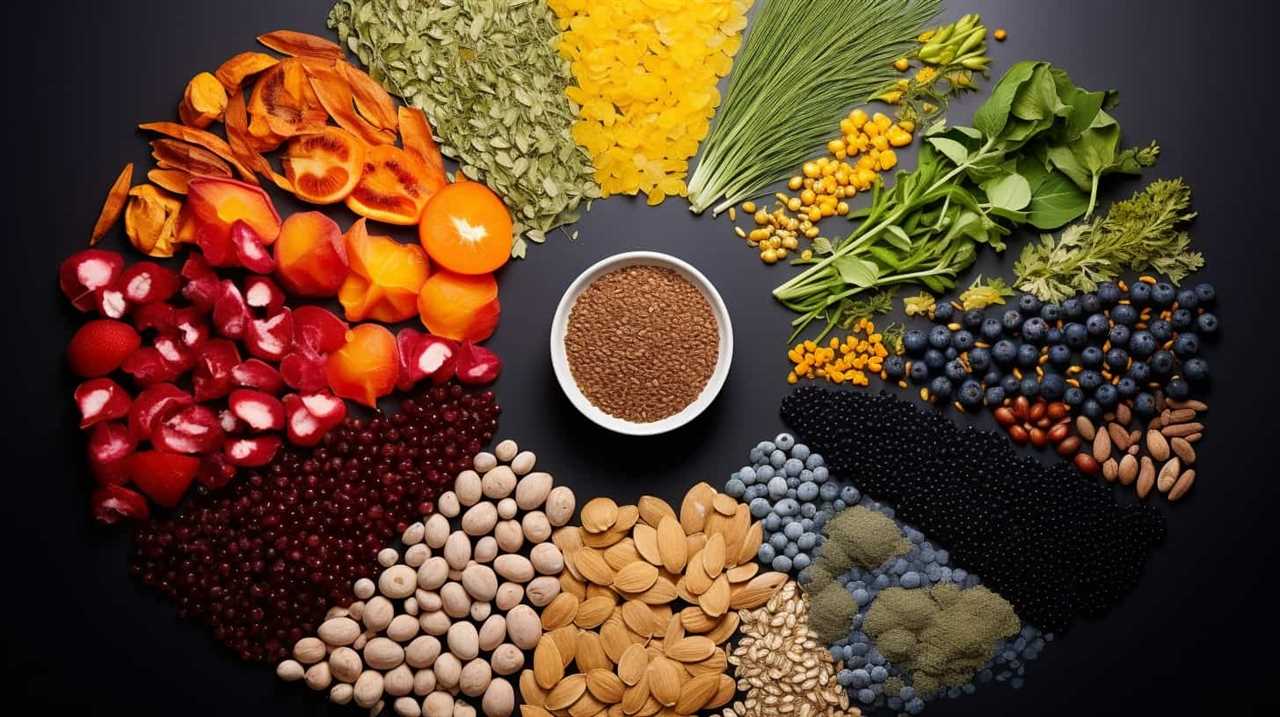
Watermelon Seeds
As I continue discussing high-protein seed alternatives in my article on the vegan diet, let’s now turn our attention to watermelon seeds. Watermelon seeds are often discarded, but they’re actually packed with nutrients and can be a great addition to a vegan diet. These seeds are rich in protein, fiber, healthy fats, and essential minerals such as magnesium, iron, and zinc. Incorporating watermelon seeds into your meals can help boost your protein intake and provide a satisfying crunch.
There are various ways to enjoy watermelon seeds. One option is to roast them, which enhances their nutty flavor and makes them a perfect snack. You can also grind them into a powder and use it as a protein-rich addition to smoothies, oatmeal, or baked goods. Additionally, watermelon seeds can be added to salads or used as a topping for soups and stir-fries to add a nutritious twist.
Poppy Seeds
I enjoy incorporating poppy seeds into my vegan diet because they offer numerous nutritional benefits. These tiny seeds are rich in essential minerals like calcium, magnesium, and iron, which are important for maintaining overall health.
Additionally, poppy seeds are versatile in the kitchen and can be used in a variety of dishes, adding a nutty flavor and crunchy texture. From sprinkling them on top of salads to using them in baking, poppy seeds are a great addition to any plant-based diet.

Nutritional Benefits of Poppy Seeds
Poppy seeds provide essential nutrients for a vegan diet. Here are three reasons why you should consider adding poppy seeds to your meals:
-
Rich in nutrients: Poppy seeds are packed with essential minerals like calcium, iron, and magnesium. They also contain vitamins B1, B6, and E, which are important for overall health.
-
Versatile in baking: Poppy seeds are commonly used in baking, adding a nutty flavor and a delightful crunch to your favorite recipes. From muffins to breads, incorporating poppy seeds can elevate the taste and texture of your baked goods.
-
Skincare benefits: Poppy seeds aren’t only great for cooking but also for skincare. They can be used in exfoliating scrubs to remove dead skin cells and promote a healthy glow.
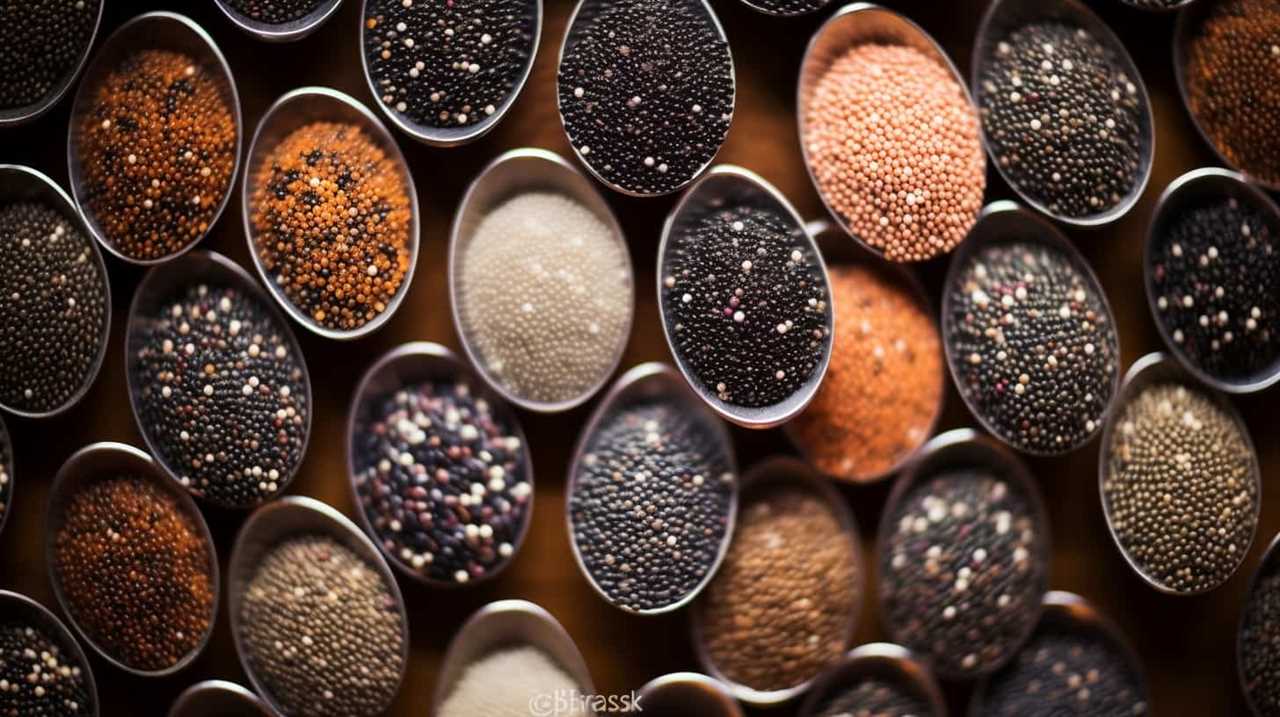
With their nutritional benefits and versatility in both baking and skincare, it’s easy to see why poppy seeds are a valuable addition to any vegan diet.
Now, let’s explore the culinary uses for poppy seeds.
Culinary Uses for Poppy Seeds
After exploring the nutritional benefits of poppy seeds, it is important to delve into their culinary uses as a valuable addition to a vegan diet. Poppy seeds are not only nutritious but also versatile in the kitchen. Here are some popular culinary uses for poppy seeds:
| Culinary Uses | Description | Health Benefits |
|---|---|---|
| Baking | Poppy seeds are commonly used in baking, adding a nutty flavor and crunchy texture to bread, muffins, and cakes. | Poppy seeds are a good source of essential minerals like calcium, iron, and magnesium. They also contain dietary fiber, which aids in digestion. |
| Salad Topping | Sprinkle poppy seeds on top of salads for an extra crunch and burst of flavor. They pair well with fruits, nuts, and leafy greens. | Poppy seeds are rich in antioxidants, which help protect the body against harmful free radicals. They also contain omega-3 fatty acids, which may have anti-inflammatory effects. |
| Dressings and Sauces | Poppy seeds can be ground and mixed into dressings and sauces to enhance flavor and add texture. They work well in creamy dressings and tangy vinaigrettes. | Poppy seeds are a good source of plant-based protein, making them a valuable addition to vegan diets. They also provide energy and support muscle function. |
With their unique taste and nutritional profile, poppy seeds can elevate the flavor and health benefits of various vegan dishes. Incorporating them into your diet can be a delicious and nutritious choice.
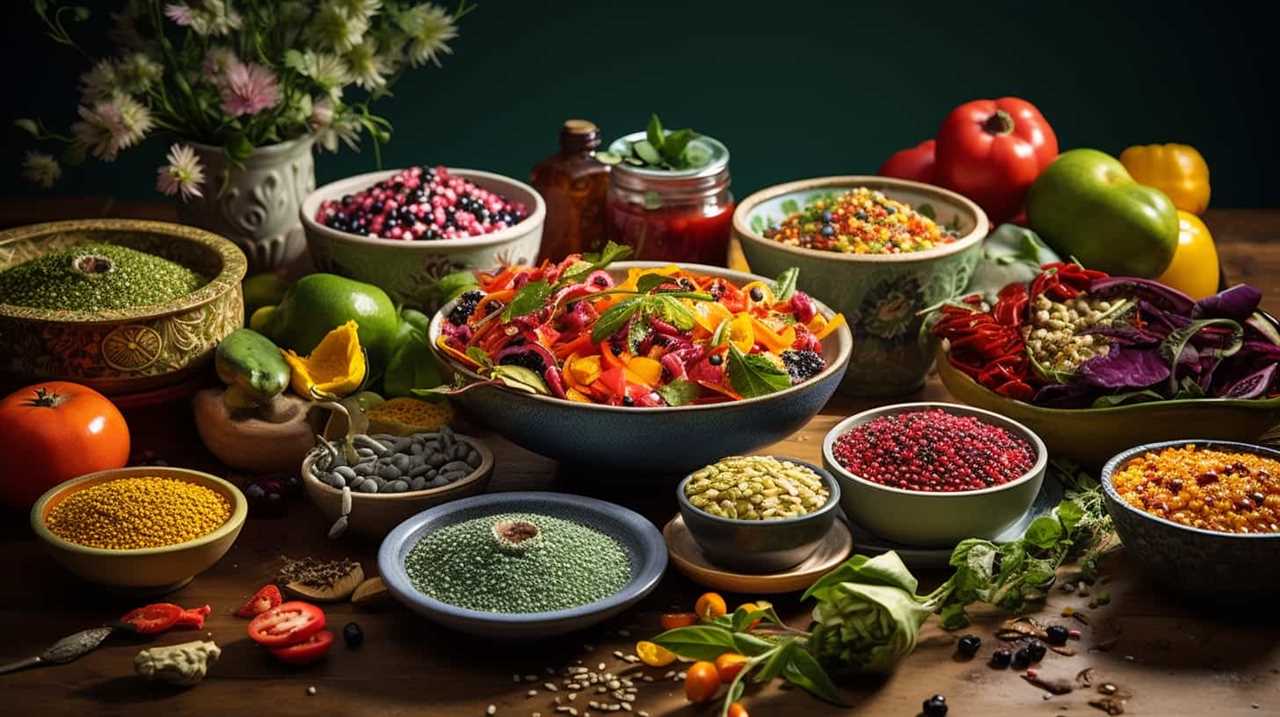
Poppy Seeds in Traditional Cuisine
Continuing the exploration of poppy seeds in traditional cuisine, I’ve discovered their versatility and cultural significance. Poppy seeds aren’t only used for their unique flavor and texture, but they also have a rich history in traditional baking and medicine.
Here are three ways poppy seeds are commonly used:
-
Poppy seeds in baking: These tiny seeds are often sprinkled on top of breads, pastries, and cakes, adding a delightful crunch and nutty taste. They can also be ground into a paste and incorporated into doughs for a more intense flavor.
-
Poppy seeds in traditional medicine: Poppy seeds have been used in traditional medicine for centuries. They’re believed to have various health benefits, including pain relief, improved digestion, and reduced anxiety. However, it’s important to note that the medicinal use of poppy seeds should be done under the guidance of a healthcare professional.

Poppy seeds aren’t only a delicious addition to baked goods, but they also have a long history of use in traditional medicine. Incorporating these versatile seeds into your culinary repertoire can add a unique and nutritious element to your meals.
Frequently Asked Questions
Can These Seed Alternatives Be Used as a Substitute for Meat in a Vegan Diet?
Yes, these seed alternatives can be used as a substitute for meat in a vegan diet. They provide essential nutrients and can be incorporated into various recipes to create delicious and nutritious vegan dishes.
Are There Any Potential Allergic Reactions or Side Effects Associated With Consuming These Seeds?
There may be potential allergic reactions or side effects associated with consuming these seeds. It’s important to be aware of any allergies or sensitivities you may have before incorporating them into your diet.
How Should These Seeds Be Stored to Maintain Their Freshness and Nutritional Value?
To maintain the freshness and nutritional value of seeds, store them in a cool, dry place, like a pantry or refrigerator. This helps prevent spoilage and preserves their beneficial properties.
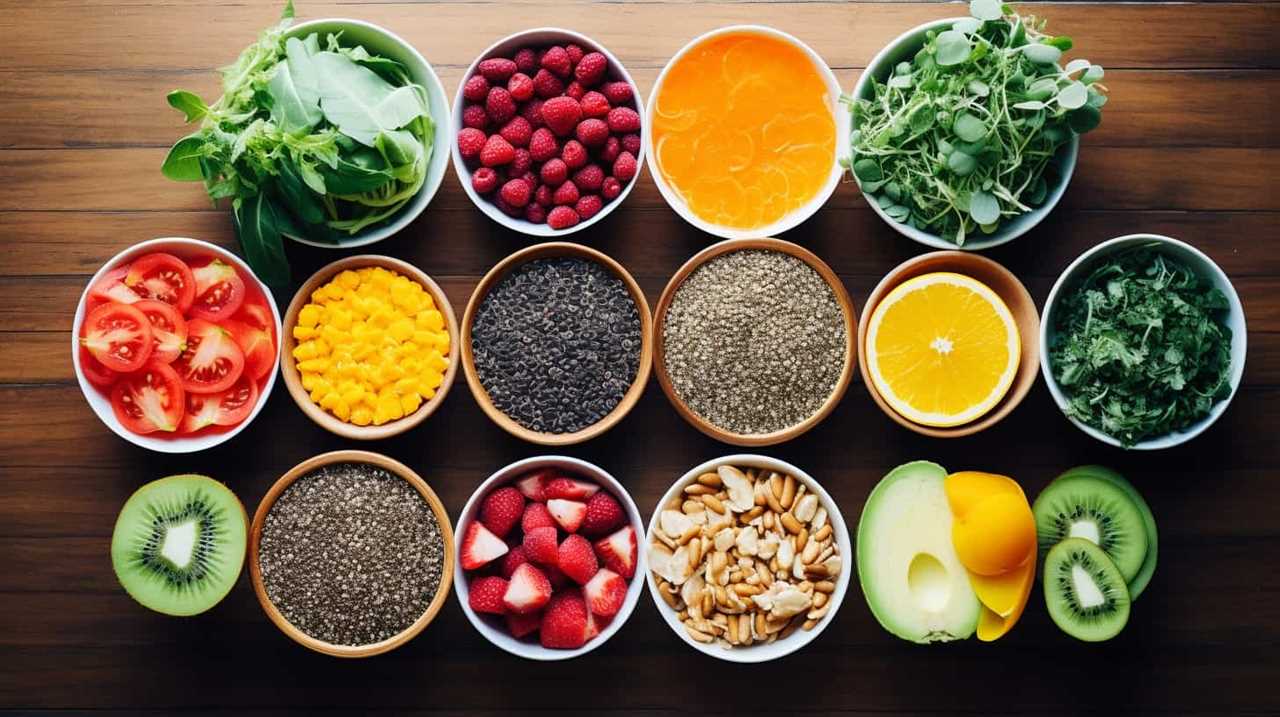
Are These Seeds Suitable for Individuals With Certain Dietary Restrictions, Such as Those Following a Gluten-Free or Nut-Free Diet?
Yes, there are gluten-free alternatives and nut-free options available in these high-protein seeds. They can be suitable for individuals with dietary restrictions, providing a healthy and nutritious source of protein.
Can These Seeds Be Consumed Raw, or Do They Need to Be Cooked or Processed in Any Way Before Consumption?
Seeds can be consumed raw or cooked, depending on personal preference. Raw seeds retain more of their nutritional benefits, such as enzymes and antioxidants. They can also be used creatively in recipes like energy balls or sprinkled on salads for added crunch.
Conclusion
In conclusion, these high-protein seed alternatives can be a valuable addition to a vegan diet.
Like little powerhouses, chia seeds, hemp seeds, flax seeds, pumpkin seeds, sunflower seeds, buckwheat seeds, pomegranate seeds, watermelon seeds, and poppy seeds offer a range of nutrients and health benefits.

Incorporating these seeds into your meals can help ensure you’re getting enough protein, omega-3 fatty acids, and other essential nutrients.
So go ahead and sprinkle these tiny wonders into your favorite dishes and enjoy the goodness they bring.




